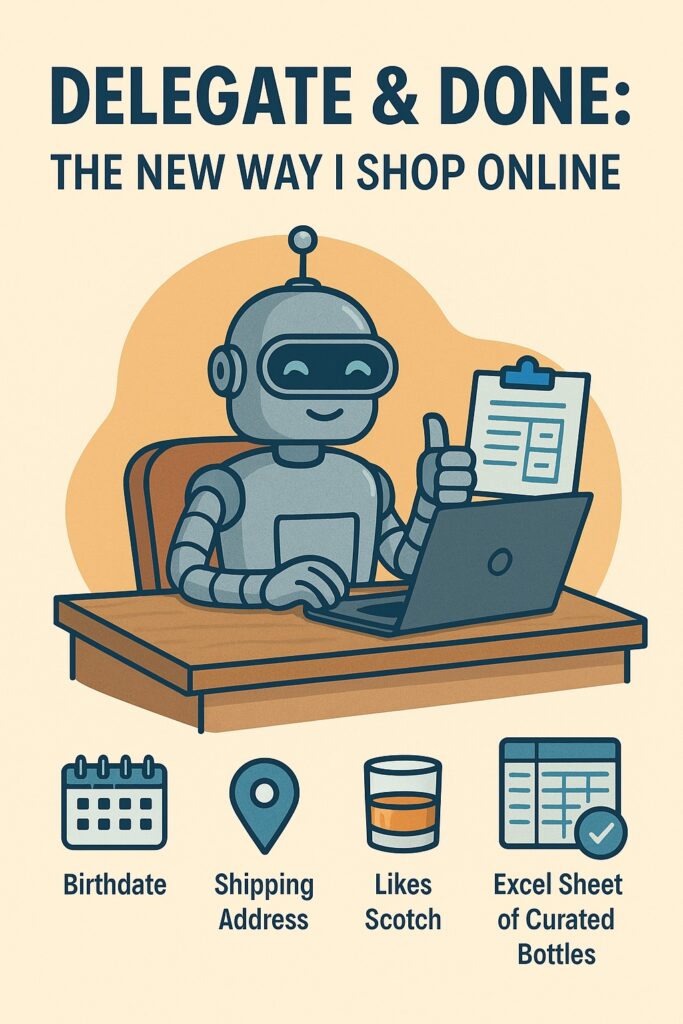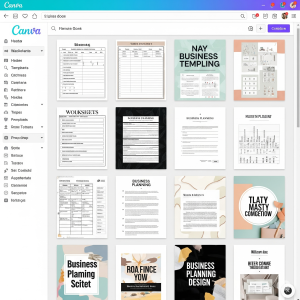
We make an average of 35,000 decisions a day. By the time you’ve figured out dinner, scanned your inbox, and doom-scrolled through 40 tabs for the “perfect” gift… your brain is begging for mercy.
That’s why when I needed to find a birthday whiskey gift for my Scotch-loving uncle, I didn’t add anything to cart, I delegated it to AI.
From Tabs to Tasks: The Agent That Shopped For Me
I used ChatGPT’s Agent platform (an actual agent, not just the chatbot) to research whiskey options within a $40–$60 budget.
Here’s what I gave it:
- ✅ My birthdate (for site age-verification modals)
- ✅ My uncle’s shipping address in New Jersey
- ✅ A simple prompt: “He likes Scotch but is open to anything good.”
And just like that, 20 minutes later I got a tidy Excel sheet dropped into my inbox.
Here’s a peek at what it delivered:
| Bottle | Price | Notes |
|---|---|---|
| Johnnie Walker Black | $39 | A smoky classic. Reliable. Won’t raise eyebrows. |
| Talisker Storm | $55 | Bold maritime peat. Feels like a wave punched you lovingly. |
| I.W. Harper Cabernet | $60 | Bourbon in wine casks. Smooth, slightly fancy. |
| (+ 3 more thoughtful picks) | — | — |
I didn’t lift a finger. No comparison charts, no Reddit rabbit holes. Just: Delegate → Done.
Why This Matters (and Why It’s More Than Just Whiskey)
We spend 10+ hours a month comparison shopping. That’s over 120 hours a year of toggling tabs, reading Amazon reviews from “Karen in Omaha,” and trying to make one smart purchase decision.
It’s exhausting. The psychologist Barry Schwartz coined this effect “the paradox of choice.” The more options we have, the worse we feel—even after we buy something.
AI agents break that loop by:
- 🔄 Automating research without overwhelming you with info
- 🧠 Reducing decision fatigue and freeing up mental RAM
- 📈 Giving just enough context to make you feel confident, not confused
Today it’s whiskey. But tomorrow?
Try:
- ✈️ Vacation planning (Flight + hotel + itinerary in one go)
- 💻 Laptop buying (Specs, reviews, comparisons—done)
- 🏥 Healthcare plans (Yeah… I’m scared too, but AI might help)
What I Actually Prompted (In Case You Want to Try This)
Here’s the exact breakdown I gave the agent:
Task: Find a whiskey gift for my uncle
Budget: $40–$60
Preferences: He likes Scotch but is open to other whiskey styles
Constraints: Must be shippable to New Jersey, consider local laws
Extras: Include direct purchase links and tasting notesThe platform handled everything from price availability, shipping legality, and even a little flourish in the tasting notes that made it feel curated.
I used OpenAI’s GPT-4o-based assistant and connected it with a research workflow. You could replicate something similar using:
- OpenAI’s Assistant API
- Perplexity (great for product research)
- AgentOps.dev (for workflow building)
Traditional Product Research? Useful But Flawed
Look, I’m not anti-research. Sometimes I want to obsessively compare five espresso machines I’ll never buy.
But most of the time?
We’re just trying to get to “good enough” without wasting a Saturday.
Traditional comparison shopping:
- ❌ Eats up time
- ❌ Leads to second-guessing
- ❌ Often ends with “screw it, I’ll just get the same one as last year”
AI shopping flips that script.
The Catch: Let’s Talk Limitations
🧩 Biases in Results
AI agents are only as good as their data sources. If your agent pulls only from sponsored listings, you’ll get sponsored outcomes.
🔒 Privacy Concerns
Yes, I gave an AI my zip code and a preference for Scotch. No, I didn’t feed it my SSN. But AI-assisted commerce will require stronger consumer protections over time.
⚠️ Over-Reliance
The danger is blindly trusting output without verifying. Delegation shouldn’t mean abdication.
What’s Next? From Curated Shopping to AI-Led Consumption
E-commerce is moving fast:
- Amazon is experimenting with AI-generated buying guides
- Shopify merchants are building concierge bots
- Entire startups are focused on AI-led travel planning and itinerary design
This shift from “what do I buy?” to “what can you just figure out for me?” is a rethink of digital delegation.
Final Thoughts (and an Invitation)
AI agents aren’t here to replace your judgment. But they can replace your Saturday of endless Googling.
Try it. Start with something low stakes like a gift. Then work up to higher-order stuff. You might be surprised by how much time and cognitive space you get back.
Have you used an AI agent to handle a shopping task?
Drop a comment below or contact me here. I’d love to collect more stories for a follow-up.
